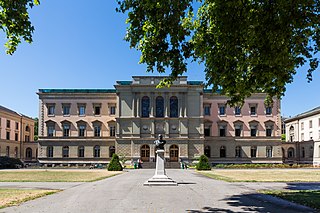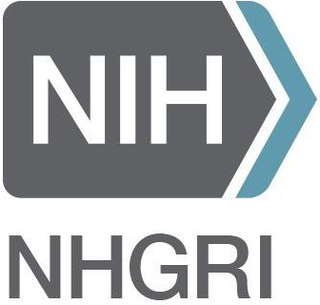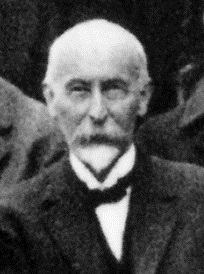Related Research Articles

Geneva is the second-most populous city in Switzerland and the most populous city of Romandy, the French-speaking part of Switzerland. Situated in the south west of the country, where the Rhône exits Lake Geneva, it is the capital of the Republic and Canton of Geneva, and a centre for international diplomacy.

The University of Geneva is a public research university located in Geneva, Switzerland. It was founded in 1559 by John Calvin as a theological seminary. It remained focused on theology until the 17th century, when it became a center for enlightenment scholarship. Today, it is the third largest university in Switzerland by number of students.
The Human Genome Organisation (HUGO) is a non-profit organization founded in 1988. HUGO represents an international coordinating scientific body in response to initiatives such as the Human Genome Project. HUGO has four active committees, including the HUGO Gene Nomenclature Committee (HGNC), and the HUGO Committee on Ethics, Law and Society (CELS).
The International School of Geneva, also known as "Ecolint" or "The International School", is a private, for-profit international school based in Geneva, Switzerland.
The International HapMap Project was an organization that aimed to develop a haplotype map (HapMap) of the human genome, to describe the common patterns of human genetic variation. HapMap is used to find genetic variants affecting health, disease and responses to drugs and environmental factors. The information produced by the project is made freely available for research.

The National Human Genome Research Institute (NHGRI) is an institute of the National Institutes of Health, located in Bethesda, Maryland.

Paul Sabatier University is a French university, in the Academy of Toulouse. It is one of the several successor universities of the University of Toulouse.

The Graduate Institute of International and Development Studies, also known as the Geneva Graduate Institute, is a government-accredited postgraduate institution of higher education located in Geneva, Switzerland.
Robert Hippolyte Chodat was a Swiss botanist and phycologist who was a professor and director of the botanical institute at the University of Geneva.

Aravinda Chakravarti is a human geneticist and expert in computational biology, and Director of the Center For Human Genetics & Genomics at New York University. He was the 2008 President of the American Society of Human Genetics. Chakravarti became a co-Editor-in-Chief of the journal Genome Research in 1995, and of the Annual Review of Genomics and Human Genetics' in 2005.

Denis Duboule is a Swiss-French biologist. He earned his PhD in Biology in 1984 and is currently Professor of Developmental Genetics and Genomics at the École polytechnique fédérale de Lausanne (EPFL) and at the Department of Genetics and Evolution of the University of Geneva. Since 2001, he is the Director of the Swiss National Research Center "Frontiers in Genetics" and since 2017, he is also a professor at the Collège de France. He has notably worked on Hox genes, a group of genes involved in the formation of the body plan and of the limbs.

The Geneva Haute école de musique is a higher music education institution in Geneva, Switzerland.

Charles-Eugène Guye was a Swiss physicist. He was born in Saint-Christophe (Champvent) and died in Geneva.

Ron David Appel is a Swiss bioinformatician, professor of proteomics and bioinformatics at the University of Geneva and executive director of the Swiss Institute of Bioinformatics.

Stylianos E. Antonarakis is a Greece-born human geneticist.

Alfonso Valencia is a Spanish biologist, ICREA Professor, current director of the Life Sciences department at Barcelona Supercomputing Center. and of Spanish National Bioinformatics Institute (INB-ISCIII). From 2015-2018, he was President of the International Society for Computational Biology. His research is focused on the study of biomedical systems with computational biology and bioinformatics approaches.

Giuseppe Merla is an Italian scientist who is a Full Professor of Molecular Biology at University of Naples Federico II and medical geneticist at Casa Sollievo della Sofferenza in San Giovanni Rotondo, Italy. He is the Managing Director of Fondazione Telethon-Genomic and Genetics Disorders Biobank, a member of EuroBioBank at the Casa Sollievo della Sofferenza Hospital. Merla and his team led the discovery of a new rare genetic syndrome intellectual development disorder with cardiac arrhythmia and the gene responsible for it. Merla is also known for his extensive research on Kabuki Syndrome. He has been declared as the Ambassador of Kabuki syndrome and received the 2019 Ambassador Day award at the Royal Villa of Monza.

Emmanouil Theophilos Dermitzakis is a Greek human geneticist and professor in the Department of Genetic Medicine and Development at the University of Geneva, where he is also Director of the Health 2030 Genome Center. He is an ISI Highly Cited Researcher and an elected member of the European Molecular Biology Organization. He is a member of the Swiss Institute of Bioinformatics, where his research group is focused on the genetics and genomics of complex traits in humans. He has joined GlaxoSmithKline as Vice President, Computational Biology in R&D.
Marguerite Champendal (1870-1928) was the first woman from Geneva to obtain her doctorate in medicine at the University of Geneva (1900). She founded a center for distributing pasteurized milk for infants there, as well as an acclaimed nursing school.
Élisabeth Decrey Warner née Reusse-Decrey is a Swiss peace activist and politician. In 1998 she founded the humanitarian organization Geneva Call which set out to involve armed non-State actors in banning the use of landmines. She served as the organization's executive president until late 2017. Decrey Warner has been widely recognized for her peace efforts. She was nominated for Switzerland as one of the 1,000 women for the Nobel Peace Prize in 2005, in 2012 she was awarded the Hessian Peace Prize, and in 2013 she received the French Legion of Honour.
References
- ↑ "Our mission". iGE3 - Universite de Geneve.
- ↑ Wanner, Mark. "The global impact of genomics: Interview with Stylianos". The Jackson Laboratory. Retrieved 2020-10-31.
- ↑ "La génétique et la génomique genevoises réunies sous la bannière d'iGE3". www.myscience.ch. 2020-05-29. Retrieved 2020-10-31.
- ↑ "New director for iGE3 - Emmanouil Dermitzakis". iGE3 - Universite de Geneve. 2020-10-01.